A complex systemic disease accompanied by skin problems is called psoriasis, the initial stage of the disease does not differ in specific symptoms. Therapeutic therapy gives the best result if carried out in a timely manner. Doctors note that in a healthy person cell death occurs after a month. A patient with psoriasis has a shortened skin renewal period, which is several days.
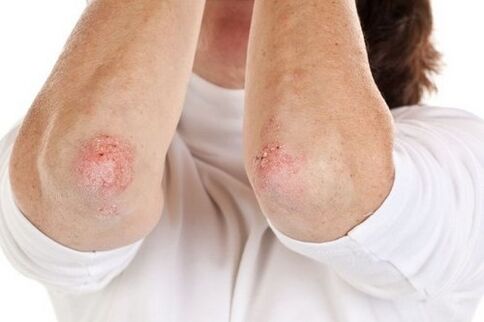
What the initial stage of psoriasis looks like, photo
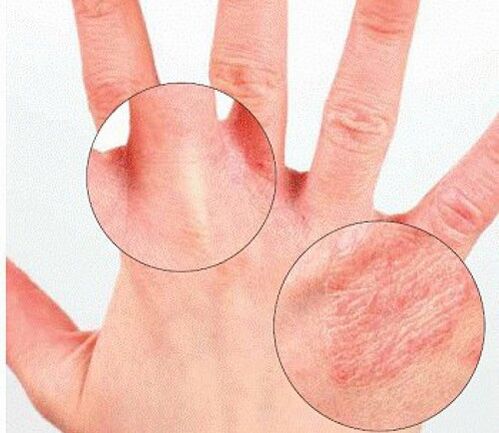
Although the disease is not contagious, patients notice impressive damage to the skin, nails and hair. On the epidermis, the red rashes are clearly visible, they are initially small in size. After some time, papules form at the site of inflammation, changed areas of a bright shade, which protrude above the skin. On their upper part there are silver scales or plaques.
At first, the papules almost do not bother the patient, in rare cases they are distinguished by itching and slight peeling. At the initial stage, the affected area does not exceed a few millimeters, in the future the area can reach 10 cm.
Psoriasis can affect different parts of the human body, so you should pay attention to the symptoms in different places:
- Confront. . . The early development of the disease suggests the presence of psoriatic plaques on the skin around the eyes, eyelids and eyebrows. The area of the nasolabial folds can also be severely affected.
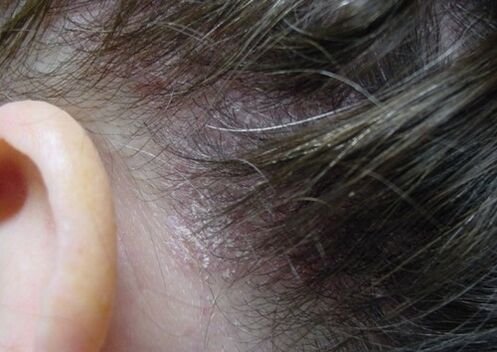 In rare cases, the spread of the disease can spread to the mucous membranes of the mouth, cheeks, tongue or lips. Some patients complain that the papules also affected the contour of the lips.
In rare cases, the spread of the disease can spread to the mucous membranes of the mouth, cheeks, tongue or lips. Some patients complain that the papules also affected the contour of the lips. - Hair root. . . On the entire surface of the head there are large scaly spots, characterized by a large number of scales. They look like dandruff in appearance. In this case, the hair does not suffer from the disease, the pathology affects only the skin. Patients experience itching, constantly scratching their heads. Often red spots are noted on the neck and ears.
- Hands. . . The palms and the interdigital space may be covered with simple papules, which have a pronounced red color. At the back, the manifestation of the disease occurs very rarely. In the presence of pathology at the fingertips, sensitivity problems are noted. Often times, psoriasis affects the nail plate.
- Elbows. . . At the onset of the disease, the patient notices single plaques with silvery scales. Gradually, degeneration occurs and a continuous area of affected skin appears.
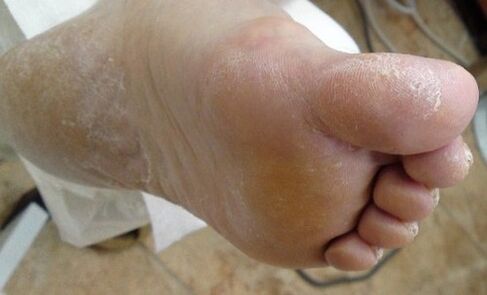 Scales and a thin film come off easily, after which you can notice a change in color to pink. In some cases, the affected area may bleed.
Scales and a thin film come off easily, after which you can notice a change in color to pink. In some cases, the affected area may bleed. - Legs. . . Most often the patient's feet and back suffer from psoriasis, the symptoms are absolutely similar to those seen on the elbows. The symptom of blood dew in the presence of a solid lesion is also present.
Causes of the disease
Psoriasis is considered to be an abnormal reaction of the body to external stimuli. It causes the development of a pathological process, which leads to too rapid renewal of the skin.
Recently, it is generally accepted that the disease is inherited. But, it is based not on one type of disease, but on several. The reason for the development of psoriasis can be a failure of metabolic processes, problems with the endocrine system, neurological disorders, weakened immunity. But, it is absolutely certain that the pathology is not of an infectious nature.
There are no exact reasons for the onset of the disease, but doctors have theories.
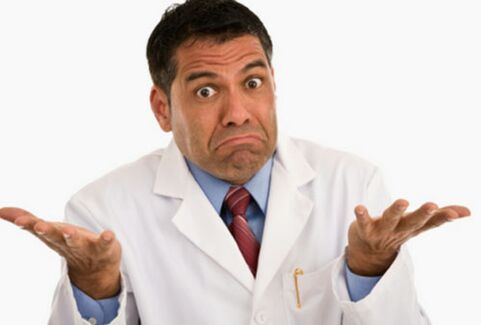
According to them, psoriasis is divided into 2 types:
- The disease is inherited due to a dysfunction of the immune system. A similar form is found in most patients. Diagnosis usually occurs at an early age, before the age of 25.
- The disease is not associated with immune problems and cannot be inherited. In this case, it occurs after 40 years, the affected area is the nails and joints.
According to doctors, patients with this disease should exclude the consumption of alcohol, sweets, salty and spicy foods. With the normalization of nutrition, an improvement in the condition of the skin is noted. Extreme heat or cold can also cause a relapse.
Symptoms
Psoriasis is a type of systemic pathology that can spread not only to the skin or nail plate. The spine, joints, tendons, endocrine and nervous systems often suffer from the disease. In addition, damage to the thyroid gland, kidneys and liver is noted.

Main symptoms of the disease:
- depression, apathy, depressive state;
- constant fatigue, decreased performance;
- the general condition is weakened.
Due to the fact that there is a complex effect on the body, the pathology began to be attributed to psoriatic disease. The main manifestation is associated with skin lesions, bright-colored papules develop on the epidermis. The affected area is scaly, itchy, and brings obvious discomfort to the patient.
If the top layer of a papule, an inflamed area is touched or removed deliberately, drops of blood may appear.
Psoriasis at the initial stage in children, photo
The disease can manifest itself even in a baby, initially the rash is noted in the skin folds. A similar phenomenon is typical for children under 2 years old. In addition, the pathology often develops in those places where contact with diapers is noted. 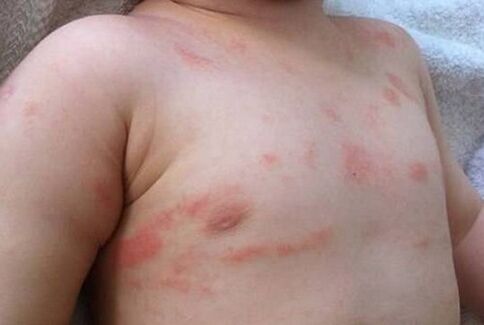 Sometimes the disease is confused with diaper dermatitis, but unlike it, in psoriasis the pathological areas have pronounced boundaries and a brighter color.
Sometimes the disease is confused with diaper dermatitis, but unlike it, in psoriasis the pathological areas have pronounced boundaries and a brighter color.
Children over 2 years old already have the same type of papules as adults. Problem areas are characterized by peeling, the pathology often affects the limbs. The scalp is affected at an older age, similar problems can be found in a child after 10 years. From this period, the symptoms are quite similar to the manifestations of psoriasis in adults.
Most cases of psoriasis in a baby occur after the transfer of a staph infection.
How to treat
When early stage psoriasis is detected, the main treatment is not always necessary. Often specialists limit themselves to preventive measures.
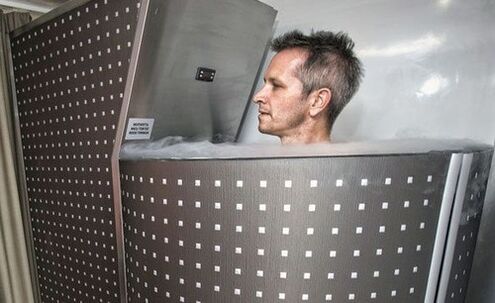
In order to eliminate the manifestations of the skin disease, the following techniques are used:
- Cryotherapy is a method of exposure to cold in a pathological area;
- Plasmapheresis - purification of blood composition;
- Ultraviolet therapy - the patient receives short sessions, similar to visiting a solarium. In order to achieve greater efficiency, the appointment of special means (PUVA therapy) is prescribed.
It should be noted that self-treatment with ultraviolet light is prohibited. Due to the fact that the dosage calculation may be incorrect. After all, a small dose is medicine and exceeding it can make the process worse. The same recommendations apply to sunbathing.
Today it is impossible to completely get rid of the disease. According to doctors, the body retains the memory of the transferred disease, which can manifest itself in the presence of provoking factors. Due to the fact that relapse often occurs unexpectedly, patients should register with a dermatologist.
Folk remedies
If the patient does not have an ongoing process, it is possible to stop the symptoms without the help of an official drug. There are recipes that can get rid of psoriasis, if there is an initial degree.
How to beat the disease with folk recipes:
- To get the balm you need 20 chicken eggs from domestic hens. The product is boiled within 15 minutes after boiling. Only the yolk is necessary for the egg, it is kneaded into a homogeneous porridge. The finished mass is carefully fried in a pan without adding oil.
 The heat should be low, as the yolk will need to simmer for about 45 minutes. The mixture is removed from the heat and squeezed through cheesecloth, squeezed oil lubricates the problem areas twice a day.
The heat should be low, as the yolk will need to simmer for about 45 minutes. The mixture is removed from the heat and squeezed through cheesecloth, squeezed oil lubricates the problem areas twice a day. - Papules are treated with freshly made juice of celandine. Such manipulation is carried out all summer, it is possible to repeat several seasons.
- To get a complex ointment, you need to take 10 grams of solid oil, 30 grams of fresh honey, 50 grams of birch tar, 10 grams of boric acid and fish oil, as well as protein from one eggof chicken. The mixture is stored in a dark place, and the papules are smeared daily.























